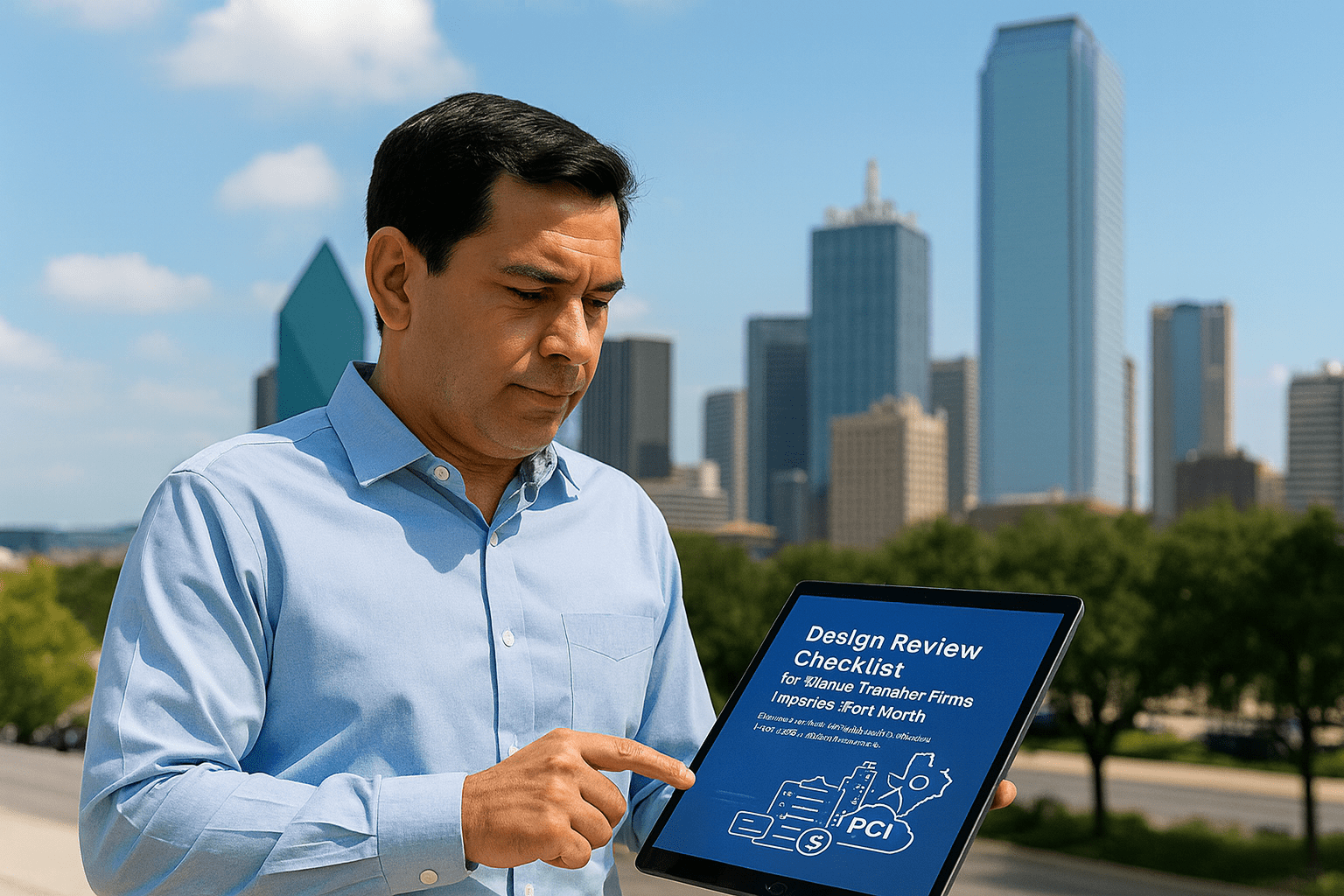How to Build PCI-Ready, Fraud-Resistant, and Audit-Proof Cloud Systems

Why This Matters in DFW
In Dallas–Fort Worth, money transmitters are under more pressure than ever. Customers want speed and digital convenience. Partners and regulators, on the other hand, want airtight proof that you’re secure.
We’ve seen it firsthand: a Fort Worth transfer firm nearly lost its banking relationship after a weak audit, and another in Dallas had to refund weeks of transactions after a phishing attack. Both had IT systems that looked fine on the surface but weren’t checklist-ready.
This guide gives you a practical design review checklist — not abstract cloud jargon, but specific steps tied to Texas MSB licensing, FinCEN registration, and PCI DSS compliance. Use it to keep your transfers flowing, your regulators satisfied, and your banking partners confident.
1. Align Security Controls with PCI DSS and Texas MSB Requirements
Generic cloud advice won’t cut it for Texas money transmitters.
- Would your current setup pass a PCI DSS audit tomorrow without last-minute scrambling?
- Do you have documentation ready for a Texas Department of Banking examiner if they asked about encryption or fraud monitoring?
One Fort Worth operator only discovered during an audit that their vendor wasn’t maintaining PCI scope documentation. That near-miss cost them weeks of remediation. Build PCI + MSB requirements directly into your checklist to avoid surprises.
2. Verify Vendor & Cloud Provider Alignment with Compliance Needs
If you’re using platforms like MoneyGram white-label or Ria, remember: their compliance posture is your compliance risk.
Your checklist should confirm that vendors:
- Provide PCI attestation reports you can show auditors
- Stay registered with FinCEN and meet Texas MSB license standards
- Support incident response timelines that match your SLAs
We’ve seen Dallas firms forced into expensive re-audits because their vendor couldn’t prove PCI compliance. Bake vendor verification into your checklist before it becomes your problem.
3. Build Fraud Detection & Phishing Controls Into Your Cloud Setup
Fraud is the number-one risk we hear from MSBs across DFW. Attackers target firms with lean IT staff and high transaction volumes.
Checklist essentials:
- Multi-layer fraud detection (AI monitoring + manual review)
- Phishing-resistant MFA for all staff logins
- Vendor testing to confirm fraud controls actually work
One Dallas firm spent months restoring trust after a teller’s phishing click led to fraudulent transfers. The cost? Customer refunds, regulator reports, and reputation damage. A fraud-control checklist step could have stopped it early.
4. Map Security Testing to Audit-Ready Artifacts
Security testing is wasted if you can’t prove it to an auditor.
Your design checklist should require:
- Annual penetration tests scoped to PCI environments
- Documentation of remediation in audit-friendly language
- Evidence retention for Texas DoB and partner bank reviews
We worked with a Plano firm that had excellent defenses but almost failed compliance because their reports weren’t written in regulator-friendly terms. Translate testing into audit artifacts, not just technical data.
5. Define Incident Response with DFW Realities in Mind
Your systems don’t operate in a vacuum. They sit in branches across Dallas, Plano, and Fort Worth. When incidents happen, local response times matter.
Checklist questions:
- Can your IT partner guarantee same-day on-site support in Dallas County?
- Do you have 24–48h response SLAs for outlying counties like Denton or Johnson?
- Have you tested bank partner notification protocols for incidents?
One Irving-based MSB avoided escalation when their provider could show up on-site within hours of a fraud alert. Geography belongs in your response checklist.
6. Document Third-Party Risk Reviews for Banking Partners
Banks scrutinize MSBs in DFW more than ever, especially with new entrants like Goldman Sachs and Citi expanding locally. They want to know your vendors won’t create downstream risk.
Your checklist should:
- Track third-party due diligence reports
- Maintain a vendor risk register
- Provide quick summaries for bank relationship managers
Banks are increasingly rejecting partners who can’t produce vendor risk documentation. Show you’ve done your homework and keep your pipeline open.
7. Tie Everything Back to Business Continuity
Finally, your checklist isn’t complete unless it connects to business continuity.
Ask:
- Do we have backup systems that meet PCI data retention requirements?
- Can we resume operations if a vendor platform fails?
- Have we tested failovers within the last 12 months?
A Denton firm once had transfers down for two days after a vendor outage. Regulators and customers don’t accept “the vendor went down” as an excuse. Continuity planning belongs at the top of your design review.
Closing: Your Local Security Partner in DFW
Money transfer firms in Dallas–Fort Worth can’t afford generic cloud security advice. You need a checklist grounded in Texas MSB rules, PCI DSS requirements, and the realities of fraud in our region.
At CyberCile, we specialize in helping DFW transmitters:
- Translate security testing into audit-ready artifacts
- Stay compliant with FinCEN + Texas DoB requirements
- Prove resilience to banks and regulators
If you’re running branches from Plano to Fort Worth and want a local partner who speaks your compliance language, let’s
Schedule Your PCI + MSB Checklist Review https://calendly.com/cybercile/15min

